Marchés
Lors de la conception d’une intervention humanitaire et de la prise de décisions quant à l’utilisation des transferts monétaires, l’analyse générale des options de réponse doit inclure une analyse de marché. Il est prouvé qu’offrir un soutien ciblant le fonctionnement des marchés accélère la reprise et accroît la résilience dans les zones affectées par une catastrophe.
De nombreuses organisations ont investi dans la mise au point d’outils visant à faciliter l’analyse de marché et réfléchissent à la mise en place de programmes basés sur les marchés plus holistiques. Elles envisagent des interventions tirant profit du marché (basées notamment sur des transferts monétaires aux populations affectées), ainsi que des interventions soutenant directement les marchés (comme l’octroi de subventions conditionnelles aux vendeurs/euses pour la remise en condition du marché).
Initiatives associées
Contenu associé

1.2 Introduction à l’analyse de marché
Cours
Ce cours de 30 minutes offre une introduction à l’analyse de marché pour les contextes d’urgence. Il contient des contributions d'experts dans ce domaine. Ce cours a été développé en collaboration avec l'International Rescue Committee et le CALP Network et grâce au financement d’USAID/OFDA et de l’Agence Suisse pour le Développement et la Coopération. Il est destiné aux...

2.4 Un guide pratique pour l’analyse de marché
Cours
Ce cours en ligne de 3.5 heures vise à fournir aux équipes qui conduiront des analyses de marchés en contextes humanitaires une compréhension approfondie de la théorie et des étapes à suivre afin de leur permettre de comprendre le pourquoi et le comment du processus à suivre. Les participants seront guides à travers un scenario d'analyse de marchés d'urgence. Ce cours s'appuie sur...
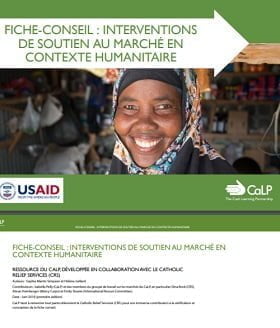
Fiche-Conseil : Interventions de soutien au marché en contexte humanitaire
Guides et outils
La fiche conseil définit le programme de soutien au marché en contexte humanitaire et le décrit dans la pratique. Elle permet aux praticiens humanitaires d’envisager systématiquement des interventions de soutien au marché, parallèlement à d’autres activités du programme. Le champ d’application comprend des interventions de soutien au marché axées sur l’offre/la disponibilité...
Thematic lead
Latest

Documentation and Learning: Rapid emergency assistance to Typhoon Ruby (Hagupit) affected communities in the province of Samar, Philippines April 2015
Report
The documentation and learning study identifies good practices and lessons from the implementation of the Rapid Emergency Assistance to Typhoon Ruby (Hagupit) Affected Communities in the Province of Samar by Christian Aid (CA) and its local NGO partners – Coastal Core Incorporated (CCI), Center for...

Report from the Inaugural Markets and WaSH Learning Event
Report
This report summarizes the presentations and discussions that took place during a learning event on market-based programming targeting key humanitarian stakeholders in the WaSH sector. Held on October 13, 2015 at the IFRC office in Nairobi, the event was organized under the umbrella of the Markets in...

Overview: Rapid Assessment of Markets (RAM)
Report
The Rapid Assessment for Markets (RAM) provides a quick and basic snapshot of how key markets operate immediately after a shock, to support initial decision on feasibility of response options (cash vs in-kind, initial market support) and to identify whether or not more detailed market system analysis is...
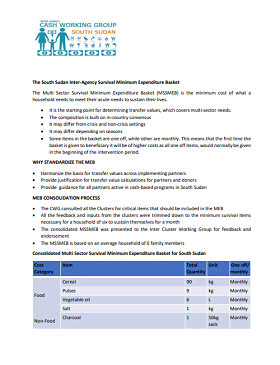
The South Sudan Inter-Agency Survival Minimum Expenditure Basket
Report
The Multi Sector Survival Minimum Expenditure Basket (MSSMEB) is the minimum cost of what a household needs to meet their acute needs to sustain their lives.
• It is the starting point for determining transfer values, which covers multi-sector needs.
• The composition is built on in-country consensus
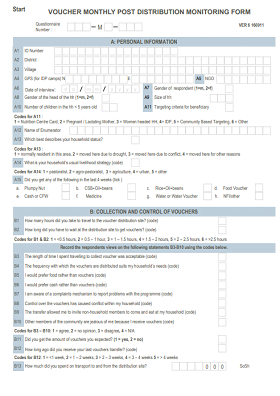
Voucher Monthly Post Distribution Form
Report

A Review of Evidence of Humanitarian Cash Transfer Programming in Urban Areas
Report
Urban poor populations frequently experience disasters of varying typology and intensity. When set against a backdrop of poverty and marginalisation, their needs can be complex. As recent urban crises have pushed humanitarian agencies to respond in urban areas, this literature review examines the...
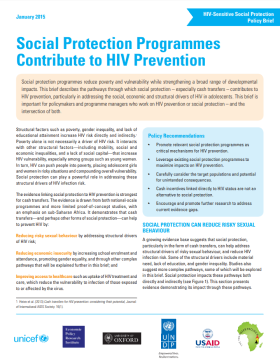
Social Protection Programmes Contribute to HIV Prevention
Policy paper
Social protection programmes reduce poverty and vulnerability while strengthening a broad range of developmental impacts. This brief describes the pathways through which social protection – especially cash transfers – contributes to HIV prevention, particularly in addressing the social, economic and...

Integrating Gender throughout a Project’s Life cycle 2.0: A Guidance Document for International Development Organisations and Practitioners
Guidelines and Tools
The overarching premise of this document is that to conduct effective, responsible development work, incorporating gender at all stages of a project’s life cycle – from project design and proposal development to field implementation and monitoring, evaluation and learning – is critical. As such,...

Research on Food Assistance for Nutritional Impact (REFANI): Literature review
Report
The REFANI literature review identifies existing evidence on the use of Cash Transfer Programmes (CTPs) and the impact of CTPs on acute malnutrition in humanitarian contexts. The review is structured as follows: Section A discusses the global burden of acute malnutrition; Section B highlights...

Strengthening Markets in Crisis
Presentation
All around the world, people depend on markets for their lives and livelihoods. But what happens to these markets when an emergency occurs? This video explains the concept behind cash, voucher and market assistance, which is rapidly becoming a modality of choice for humanitarian programmes engaged in...
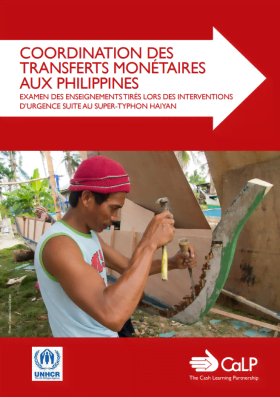
Coordination des Transferts Monétaires aux Philippines: Examen des enseignements tirés lors des interventions d’urgence suite au Super Typhon Haiyan
Rapport
Les cinq dernières années ont été marquées par la tendance au recours accru aux transferts monétaires comme modalité d’interventions en situations d’urgence dans l’ensemble du secteur humanitaire. La fongibilité des transferts monétaires, dès lors qu’ils sont effectués sans restriction,...

Tigo Cash Senegal
Guides et outils
Mobile Cash S.A (“MCSA”) was created in 2012 as a subsidiary of the Millicom group, it obtained its EME license from bceao following the decision of February 13, 2014 under the number “EME. SN 005/2013. Mobile Cash S.A. is therefore authorized to issue and distribute electronic money to a clientele...

Part 1.4 Protection Risk and Benefits Analysis
Report
All humanitarian interventions carry risks, even in-kind delivery of goods and services. Cash programming is no exception. Specific areas of risk include:
Safety and dignity.
Humanitarian access to crisis-affected populations.
Crisis-affected populations’ access to aid.
Data protection and beneficiary...

Livelihoods Toolbox
Guidelines and Tools
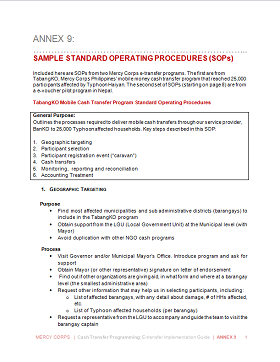
Annex 9: Sample Standard Operating Procedures (SOPs)
Report
Included here are SOPs from two Mercy Corps e-transfer programs. The first are from TabangKO, Mercy Corps Philippines’ mobile money cash transfer program that reached 25,000 participants affected by Typhoon Haiyan. The second set of SOPs (starting on page 8) are from a e-voucher pilot program in Nepal.
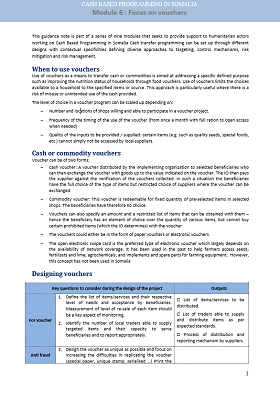
Cash Based Programming In Somalia – Module 6: Focus On Vouchers
Report
This guidance note is part of a series of nine modules that seeks to provide support to humanitarian actors working on Cash Based Programming in Somalia Cash transfer programming can be set up through different designs with contextual specificities defining diverse approaches to targeting, control...

A Review of Evidence of Humanitarian Cash Transfer Programming in Urban Areas: Annexes
Report
Annexes to accompany the working paper ‘A review of evidence
of humanitarian cash transfer programming in urban areas”

Lessons Learned for Nepal Earthquake Response
Report
The aim of this product is to improve the performance of humanitarian actors in the response of the Nepal earthquake, assist agencies working in the response and encourage positive action by decision makers. The lessons learned, stated in this document, have been a product of the analysis of main findings...

Transcript: Market Analysis for Urban Humanitarian Response
Presentation
This is the transcript for ALNAP’s 12th urban webinar. The recording can be viewed here. This webinar focused on how market analysis can support effective urban humanitarian response. Alexandre Gachoud from Oxfam, Laura Phelps from NRC and independent consultant Emmeline Saint shared their experiences...

Multiplier Effects in Humanitarian Markets
Presentation
Cash, voucher and market-based humanitarian assistance stimulates local economies affected by an emergency. This video explains how, when emergency cash transfers are injected into markets, multiplier effects can yield long-term development and enable crisis-affected communities to rebuild their...
